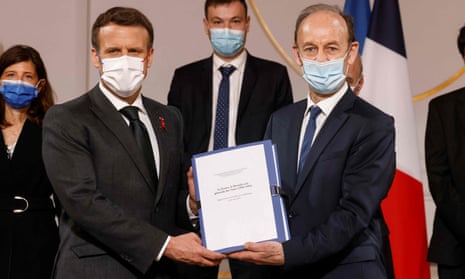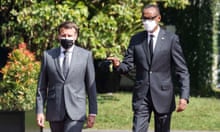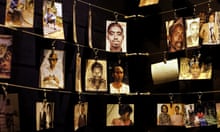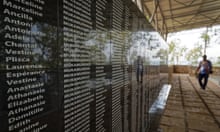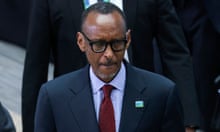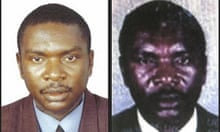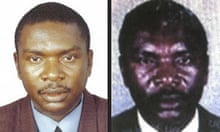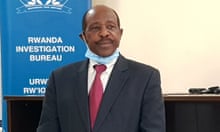France bears the burden of “heavy and damning responsibilities” in the Rwandan genocide but was not complicit in the slaughter, according to the findings of an official commission set up by Emmanuel Macron.
As many as 800,000 people, mainly from Rwanda’s minority Tutsi ethnic population, were massacred in a wave of killings in 1994. The report released on Friday confirmed long and persistent accusations that France did not do enough to halt the killings, but said there was no evidence of complicity in the massacres.
“The Rwandan crisis ended in disaster for Rwanda and in defeat for France,” the report states. “But is France complicit in the genocide of the Tutsis? If this means a willingness to be associated with the genocidal enterprise, nothing in the archives consulted proves it.”
The commission concluded: “Nevertheless, for a long time France was involved with a regime that encouraged racist massacres. It remained blind to the preparation of a genocide by the most radical elements of this regime.”
The 1,200-page report was presented to the French president on Friday by the historian Vincent Duclert, the head of the 15-strong commission whose researchers worked on the subject for two years and had access to sensitive diplomatic and military intelligence documents.
Rwanda’s government hailed the release of the report as “an important step toward a common understanding of France’s role in the genocide” and said it would be publishing its own study in the coming weeks.
Accusations that France, then led by the Socialist president François Mitterrand, may have played a part in the genocide have dogged French-Rwandan relations for the best part of the last three decades.
The massacres were set off when a plane carrying Juvénal Habyarimana, the leader of Rwanda’s Hutu-led government, and the Burundian president, Cyprien Ntaryamira, was brought down on 6 April 1994.
The killings began the following day and continued until 15 July. Over 100 days armed militias slaughtered members of the Tutsi ethnic group and some moderate Hutus in a wave of brutality that shocked the international community, although no outside country intervened to stop the killings.
Many in small villages were killed by their own neighbours using machetes and rifles. Between 250,000 and 500,000 women are believed to have been raped.
French troops led a military-humanitarian intervention called Operation Turquoise launched by Paris under a UN mandate between June and August 1994, but critics have said it was intended to support the Hutu government responsible for the genocide, a claim the report confirms.
The commission said Paris had adopted “a binary scheme opposing on the one hand the Hutu friend, embodied by President Habyarimana, and on the other hand the enemy described as ‘Ugandan-Tutsis’ to designate the RPF [Rwandan Patriotic Front].
“At the time of the genocide, it was slow to break with the interim government that was carrying out the genocide and continued to place the RPF threat at the top of its agenda,” the report states.
“It reacted belatedly with Operation Turquoise, which saved many lives, but not those of the vast majority of Rwanda’s Tutsis, who were exterminated in the first weeks of the genocide. The research therefore establishes a set of responsibilities, heavy and overwhelming.”
The Rwandan president, Paul Kagame, accused France in 2014 of being involved “before, during and after the genocide” and refused to allow the then justice minister, Christiane Taubira, and the French ambassador to attend the 20th anniversary commemorations of the genocide.
Macron has been making efforts to push France to examine its colonial past. The Rwanda commission report follows a recent dossier submitted to the Elysée by the historian Benjamin Stora on the French military’s role in the Algerian war of independence. Stora has called for a “truth commission”.
Macron will hope the contents of the Rwanda report will ease relations between Paris and Kigali in the run-up to a visit he is aiming to make later this year.
